Understanding Pool Cleaning Fundamentals
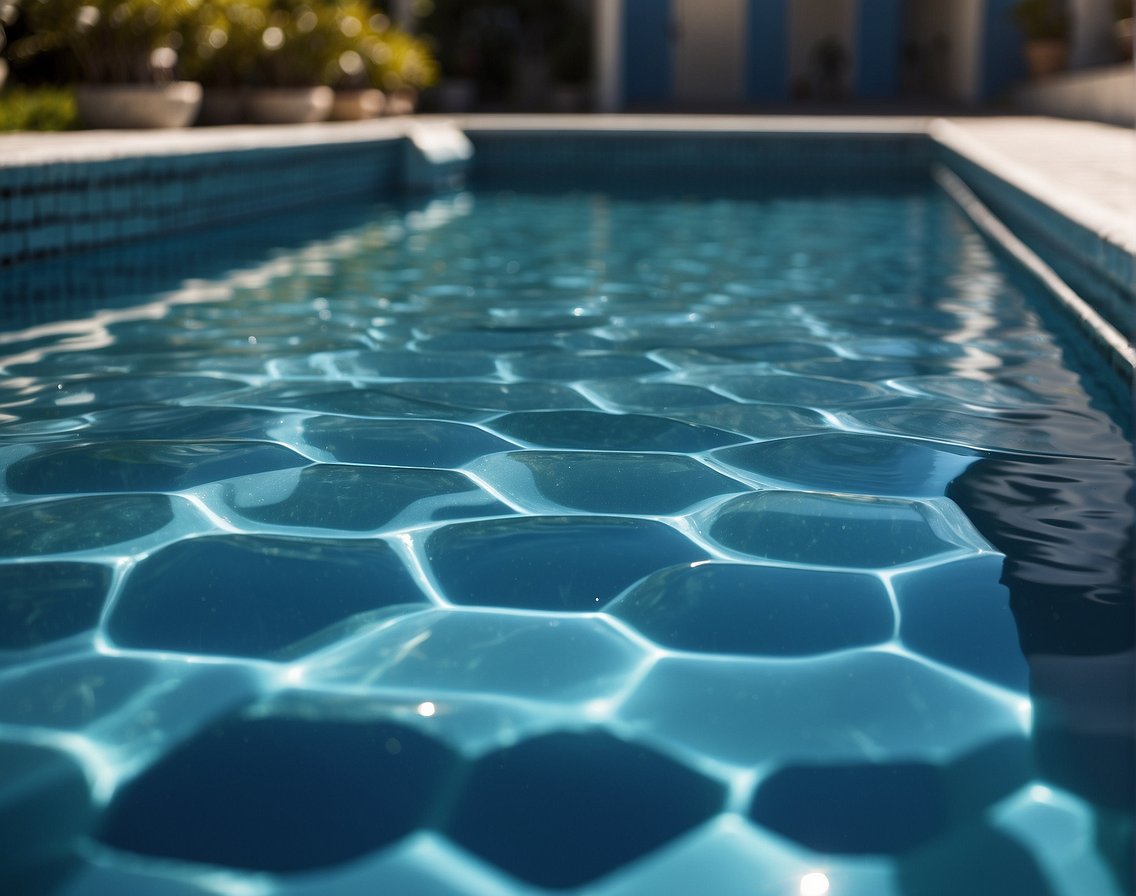
When we consider the fundamentals of pool cleaning, especially within Georgia’s unique climate, it’s important to focus on correct water chemistry, efficient circulation, regular maintenance schedules, and prompt attention to common issues. These elements are crucial for a clean and well-maintained swimming pool.
Pool Water Chemistry and Treatment
The chemistry of pool water is foundational to pool maintenance. We must ensure that the pH, alkalinity, and sanitizer levels are within the appropriate range:
- pH: 7.4 – 7.6
- Alkalinity: 100 – 150 ppm (parts per million)
- Sanitizer (e.g., chlorine or bromine): Varies depending on pool usage and type; generally, 1 – 3 ppm for chlorine
Regular chemical treatment is necessary to prevent algae growth, staining, and the spread of illness. In Georgia, the heat can accelerate chemical reactions, so more frequent monitoring and adjustment might be required.
Pool Circulation System Basics
The circulation system is the heart of any swimming pool. It consists of a pump, filter, and the associated plumbing. The pump’s job is to move water through the filter where debris is removed, and it’s essential for dispersing pool chemicals evenly. For our swimming pools in Georgia, we recommend:
- Running the pump and filter for approximately 8-12 hours per day.
- Clearing out pump baskets and ensuring filters are not clogged.
Routine Pool Maintenance Schedule
Regular maintenance is necessary to maintain a clean and sanitary pool environment:
- Daily Tasks:
- Remove floating debris with a net.
- Check and adjust chemical levels.
- Weekly Tasks:
- Brush walls and floor to prevent algae build-up.
- Vacuum the pool or run the automatic pool cleaner.
- Check equipment for signs of wear or damage.
By adhering to this schedule, we can extend the life of the pool’s equipment and surface while ensuring the water remains safe for swimmers.
Common Issues in Pool Maintenance
We regularly encounter a few issues in maintaining swimming pools in Georgia:
- Algae: Can lead to slippery surfaces and clogged filters if not treated with algaecide and shock treatment.
- Staining: Metals or minerals in the water can cause stains, requiring treatments that address the specific mineral content.
- Debris: After storms, an increase in debris can strain the system and alter the pool’s chemistry.
Quick and effective responses to these common issues can prevent more significant complications and keep your swimming pool inviting and safe for enjoyment.
In-Depth Cleaning Techniques
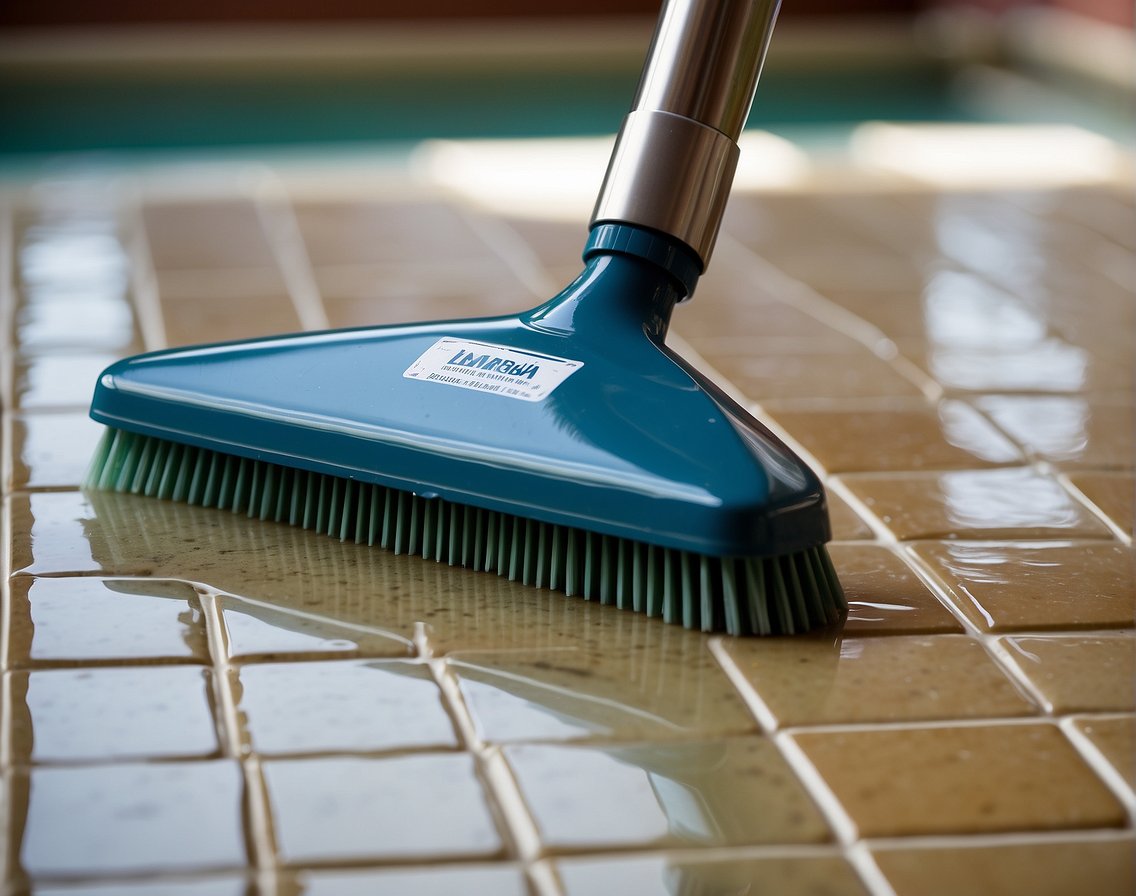
To effectively tackle algae, maintain pristine conditions, and ensure fluid operation of a pool’s systems, our detailed cleaning protocols are critical.
Mechanical Cleaning Methods
Vacuuming is essential for removing debris and preventing algae buildup. We use pool vacuums with finesse, ensuring thorough coverage of the pool’s floor and walls. By backwashing the filter, we remove accumulated waste, reviving the filter’s efficiency. When targeting tough grime, brushing is our go-to technique, carried out systematically with sturdy brushes suited for different tile types.
- Daily tasks:
- Light vacuuming for general upkeep.
- Filter inspection and cleaning if necessary.
- Weekly tasks:
- Comprehensive brushing of the pool’s surfaces.
- Backwashing the filter as per the pressure gauge reading.
Chemical Cleaning Processes
We administer pool chemicals judiciously to maintain water quality and deter algae growth. pH testing and chlorine levels are adjusted meticulously to prevent the proliferation of microorganisms. For deep-set stains and widespread algae, an acid wash may be recommended, though deployed judiciously due to its intensity.
Table 1: Routine Chemical Maintenance
| Task | Frequency | Notes |
|---|---|---|
| Chlorine Addition | Daily/As required | To keep algae at bay. |
| pH Balancing | Weekly | Ensures chlorine efficacy. |
| Calcium Hardness Check | Monthly | Prevents tile damage. |
Seasonal Pool Maintenance
Winterization is a key seasonal task to protect the pool through Georgia’s colder months. This involves thorough cleaning, chemical adjustment, and pool equipment shutdown. Conversely, de-winterization readies the pool for the swim season, entailing a systematic cleanup, equipment checks, reassembly, and water chemistry balance.
- Fall tasks:
- Intensive cleaning to remove fallen leaves and debris.
- Inspect and repair damaged tiles before winter.
- Spring tasks:
- Comprehensive system checks including pool cleaners, filters, and pumps.
- Perform chemical rebalancing and brushing to refresh the pool for use.
Specialized Pool Services
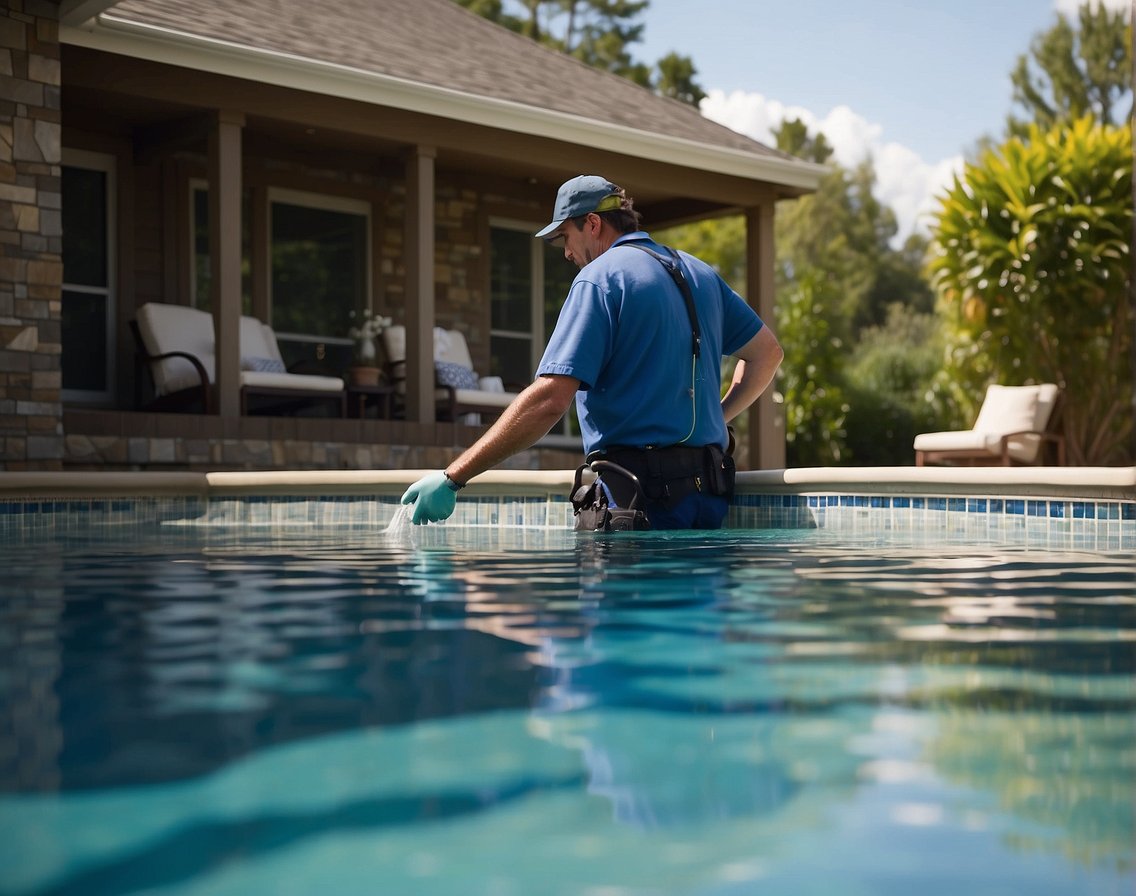
As industry experts, we dedicate ourselves to maintaining the high-quality appearance and functionality of Georgia’s swimming pools through specialized services tailored to the needs of each unique pool.
Professional Inspection and Repair
Regular inspections are crucial for the longevity of any pool. We meticulously assess pool accessories, equipment, and the overall structure. Should any issues arise, our swift pool repair services address problems ranging from tile damage to malfunctioning heaters, ensuring that Atlanta’s pools remain in pristine condition.
- Inspection Services: Equipment checks, structural integrity assessments
- Repair Solutions: Quick fixes for pool equipment, structural repairs
Advanced Pool System Care
Pool systems demand advanced care for optimal operation. Our team specializes in handling intricate aspects of pool system maintenance. Backwashing is conducted methodically, ensuring no disruption to the pool’s operations. We also maintain pumps, heaters, and other vital pool equipment with precision.
- Pool Equipment Management: Regular check-ups, maintenance schedules
- System Maintenance Routines: Backwashing processes, pump and heater inspections
Tile and Grout Specific Cleaning
Tile and grout cleaning goes beyond mere aesthetics; it’s about safeguarding the pool’s hygiene and integrity. We utilize pressure washing and stone restoration techniques to keep surfaces immaculate, focusing on grout lines to combat algae and mold growth effectively.
- Cleaning Techniques: Pressure washing for deep cleaning
- Grout Care: Specialized treatments to prevent discoloration and decay
Customized Cleaning for Pool Design
Every pool is unique, with its design and outdoor environment. Our customized cleaning takes into account factors like the pool’s construction material, surrounding flora, and specific design elements. We ensure that spas and pools are not just clean, but their aesthetic is preserved through our gentle yet effective brushing techniques.
- Design-Centric Approach: Tailored cleaning regimes, design preservation
- Diverse Cleaning Strategies: Brushing, specialized cleaning for different materials
Geographical Considerations for Georgia Pools
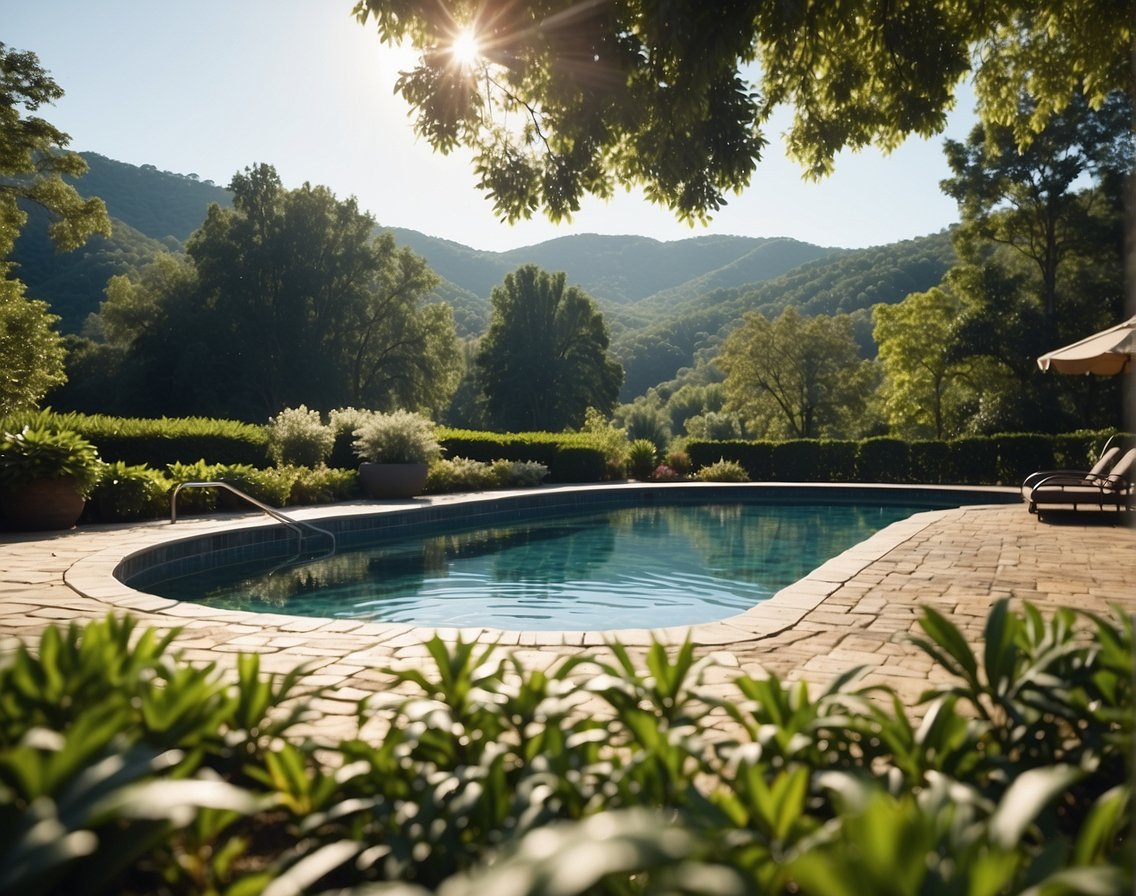
In developing an effective tile and grout cleaning strategy for swimming pools in Georgia, we must consider the local climate and environmental factors.
Adapting Methods to Georgia’s Climate
Georgia’s Climate Impact on Algae Growth:
Georgia’s warm, humid climate accelerates algae proliferation. Cities like Atlanta, Alpharetta, and Johns Creek experience high temperatures which demand regular and thorough cleaning cycles. Preventive measures include:
- Maintaining Proper pH Levels: Ideal range between 7.2 to 7.8 to hinder algae growth.
- Frequent Shock Treatment: To keep the pools in Cumming and Buford algae-free, especially during peak summer months.
Dealing with Debris Due to Weather Patterns:
Debris is common in places like Duluth and Buford due to surrounding foliage and stormy weather. Strategies include:
- Regular Skimming: Removing leaves and twigs before they sink and stain tiles.
- Proper Filtration Maintenance: Ensuring filters are clean and functional to handle the increased load during fall and spring seasons.
Consideration of Local Resources:
We use locally sourced cleaning agents suitable for Georgia’s water composition, reducing potential for damage to the pool’s tiles and grout. This supports the environment and promotes sustainability in industry practices.
Our understanding of Georgia’s specific needs ensures that our clients’ swimming pools are clean, hygienic, and visually appealing, maintaining their aesthetic appeal.
Supplementary Pool Care Information
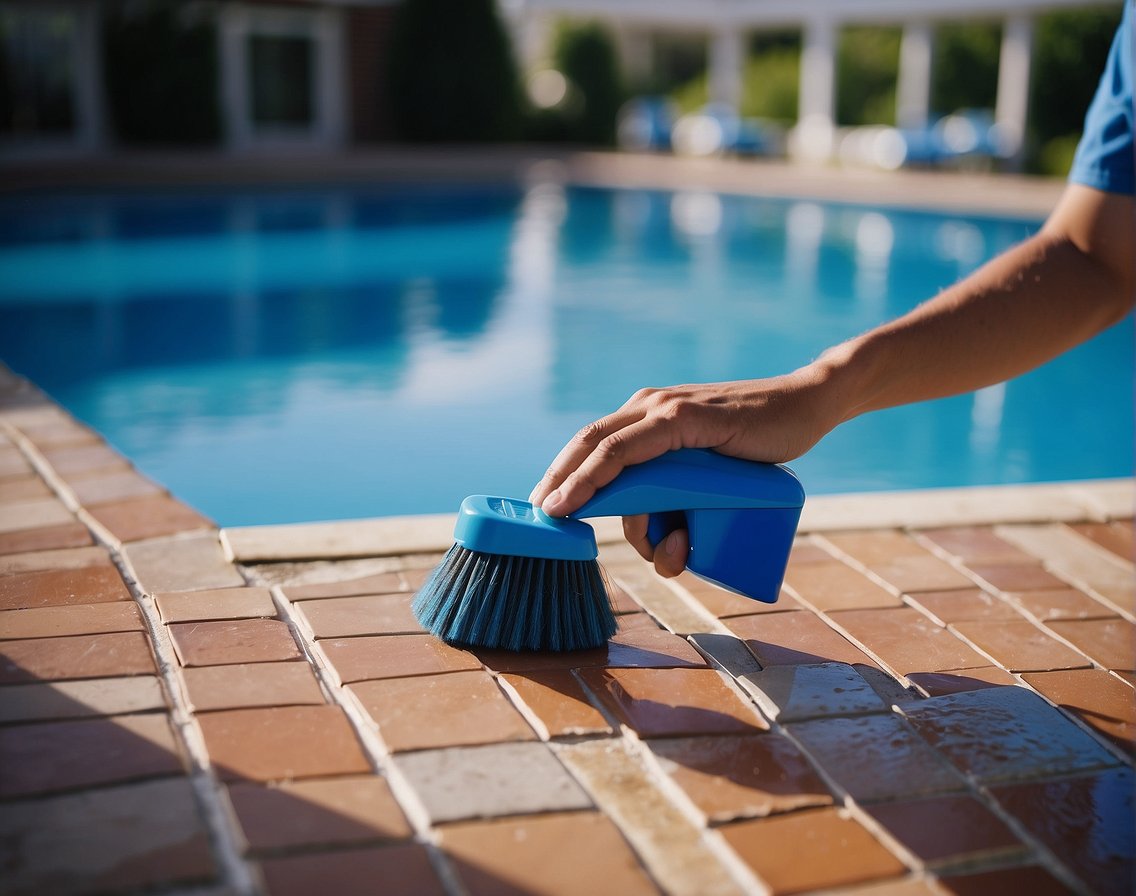
In addition to regular tile and grout cleaning, maintaining the integrity and functionality of pool accessories is crucial for the overall health of Georgia’s swimming pools.
Accessory Maintenance and Care
Proper care of pool accessories can greatly extend their life and effectiveness. We recommend frequent checks and maintenance routines for the following critical items:
- Pool Cover: Inspect for damage and clean regularly to prevent algae growth. Ensure proper storage to avoid tears.
- Pool Equipment: This includes pumps, filters, and skimmer baskets. Follow manufacturer guidelines for cleaning and maintenance schedules.
- Pump: Check for proper flow rates and clear any blockages. Regular maintenance ensures efficiency and longevity.
- Filter: Clean or replace filters as recommended to maintain water clarity and hygiene.
- Skimmer Baskets: Empty and clean out leaves and debris to maintain surface water cleanliness.
By implementing these maintenance steps, we can assure that our swimming pool remains a safe and enjoyable environment.
Frequently Asked Questions
In addressing common concerns, we focus on practical advice and specific solutions geared toward maintaining spotless pool tiles and grout.
What are the most effective strategies for cleaning pool tiles above the water line?
For cleaning pool tiles above the water line, we often recommend the use of a nonabrasive cleaner and a soft brush to avoid scratching the tiles. Additionally, using a vinegar and water solution can effectively remove calcium deposits and grime without damaging the tile surface.
How can pool tiles be cleaned without having to drain the pool?
To clean pool tiles without draining, we utilize a pumice stone or a pool tile cleaning product that lowers the water level just enough to expose the tiles. This allows us to scrub the tiles directly, and calcium deposit removal products can be applied to dissolve buildup.
What are the average costs associated with professional pool tile cleaning?
Professional pool tile cleaning prices typically range from $300 to $600, depending on the size of the pool and the extent of the tile grime. This estimate is tailored to Georgia’s market and may fluctuate based on specific service offerings and local demand.
How do I find a reliable pool tile cleaning service in my area?
We advise searching for a certified pool maintenance expert with positive customer reviews online. Reaching out to the local pool supply stores may yield recommendations for reputable service providers in Georgia.
What methods do professionals use to clean swimming pool tile and grout?
Professionals use a combination of specialized equipment and techniques such as bead blasting, pressure washing, chemical treatments, and manual scrubbing to deep clean tiles and grout effectively without causing damage.
Is muriatic acid recommended for cleaning pool tiles, and if so, how should it be used safely?
Muriatic acid can be effective for removing stubborn stains; however, we recommend it only as a last resort due to its harsh nature. If used, it should be diluted and handled with proper safety gear, as it can be corrosive to skin and emit harmful fumes.
